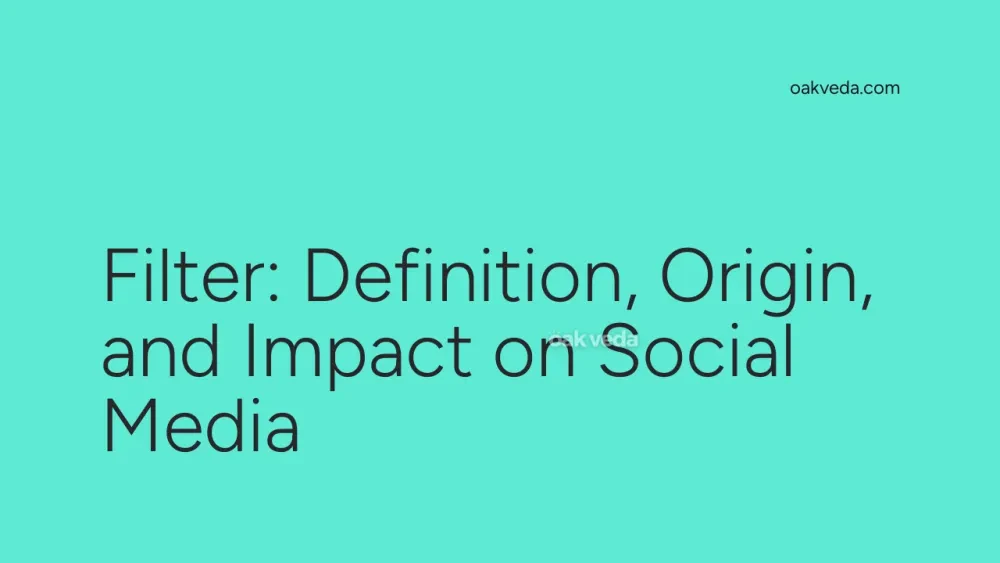
What is a Filter?
A filter in social media is a digital tool that allows users to modify or enhance their photos, videos, or live streams. These powerful features can alter various aspects of visual content, including colors, lighting, contrast, saturation, and special effects. Filters are designed to create different moods, aesthetics, or visual styles, enabling users to personalize their content and make it more appealing to their audience.
Origin and Development of Social Media Filters
The concept of filters in digital photography has been around since the early days of image editing software. However, their widespread use in social media can be traced back to the launch of Instagram in 2010. The app's initial set of filters revolutionized mobile photography, allowing users to transform their ordinary snapshots into visually striking images with just a tap.
As social media platforms evolved, so did the complexity and variety of filters. Snapchat introduced animated face filters in 2015, sparking a new trend in augmented reality (AR) filters. This innovation was quickly adopted by other platforms, leading to the diverse array of filter options we see today across various social media apps.
How Social Media Filters Work
Social media filters typically operate using a combination of image processing algorithms and, in more advanced cases, artificial intelligence and machine learning. Here's a brief overview of how they function:
- Image Recognition: For face filters, the app first detects and maps key facial features.
- Overlay Application: The chosen filter is then applied as an overlay to the original image or video.
- Real-time Processing: For live filters, this process happens in real-time, adjusting the filter as the user moves.
- Customization: Many filters allow for user adjustments, such as intensity or specific effect parameters.
Types of Social Media Filters
- Photo Filters: These adjust basic image properties like brightness, contrast, and color balance.
- Face Filters: Also known as "lenses," these modify facial features or add virtual makeup and accessories.
- World Filters: These augment the surrounding environment with virtual objects or effects.
- Video Filters: Similar to photo filters but applied to moving images.
- AR Filters: More complex filters that use augmented reality to interact with the real world.
Popular Examples of Social Media Filters
- Instagram's Clarendon: A popular filter that brightens, highlights, and intensifies shadows for a vibrant look.
- Snapchat's Dog Filter: An iconic face filter that adds dog ears, nose, and tongue to the user's face.
- TikTok's Beauty Filter: A subtle enhancement filter that smooths skin and adjusts facial features.
- Facebook's Background Blur: A video call filter that blurs the background, focusing attention on the speaker.
Impact of Filters on Social Media Culture
Filters have become an integral part of social media culture, significantly influencing how users create and consume content:
- Enhanced Self-expression: Filters allow users to present idealized or artistic versions of themselves and their surroundings.
- Increased Engagement: Eye-catching filtered content often garners more likes, comments, and shares.
- Trend Creation: Viral filters can spark global trends and challenges, driving user participation and platform growth.
- Altered Perceptions: The prevalence of filters has changed how we perceive reality vs. digital representation.
Controversies Surrounding Social Media Filters
While filters have many positive applications, they've also sparked debates:
- Body Image Issues: Some argue that beauty filters promote unrealistic standards, potentially harming users' self-esteem.
- Authenticity Concerns: Critics worry that excessive filter use can lead to a loss of authenticity in online interactions.
- Privacy and Data Collection: Advanced filters often require access to user data, raising privacy concerns.
How Brands and Influencers Use Filters
Brands and influencers leverage filters to enhance their social media presence:
- Brand Identity: Custom filters help reinforce brand identity and increase brand recognition.
- Product Showcasing: AR filters allow virtual try-ons for products like makeup or accessories.
- Engagement Boosting: Interactive filters encourage user-generated content and increase engagement.
- Campaign Amplification: Branded filters can help amplify marketing campaigns and events.
Future Trends Related to Social Media Filters
The future of social media filters looks exciting and innovative:
- Advanced AR Integration: Expect more sophisticated AR filters that seamlessly blend virtual elements with the real world.
- AI-Powered Personalization: Filters may become more personalized, adapting to individual user preferences and features.
- Cross-Platform Compatibility: We may see increased filter compatibility across different social media platforms.
- Ethical Considerations: Platforms might implement guidelines to address concerns about filter impact on mental health and body image.
FAQs about Social Media Filters
-
Are filters bad for self-esteem? While some studies suggest excessive use of beauty filters can negatively impact self-esteem, moderate use for creative expression can be positive.
-
Can filters affect my privacy? Some advanced filters require access to your camera and facial data. Always review app permissions and privacy policies.
-
Do professional photographers use social media filters? While some professionals use filters for quick edits or specific effects, many prefer more advanced editing tools for their work.
-
Can I create my own filter? Yes, many platforms like Instagram and Snapchat offer tools for users to create custom filters.
-
Do filters affect image quality? Some filters can reduce image quality, especially if overused. It's best to start with high-quality original images for the best results.
In conclusion, filters have become a powerful tool in the social media landscape, shaping how we create, share, and perceive digital content. As technology continues to evolve, we can expect filters to play an increasingly significant role in our online interactions, brand strategies, and digital self-expression.
You may be interested in:
- Brand Style Guide: Definition, Origin, and Impact
- Mega-Influencer: Definition, Origin, and Impact on Social Media
- Era: Definition, Origin, and Impact on Social Media Culture
- Trigger Warning: Definition, Origin, and Impact on Social Media
- OpenAI: Definition, Origin, and Impact on Social Media
- Conversion: Definition, Origin, and Impact in Social Media

